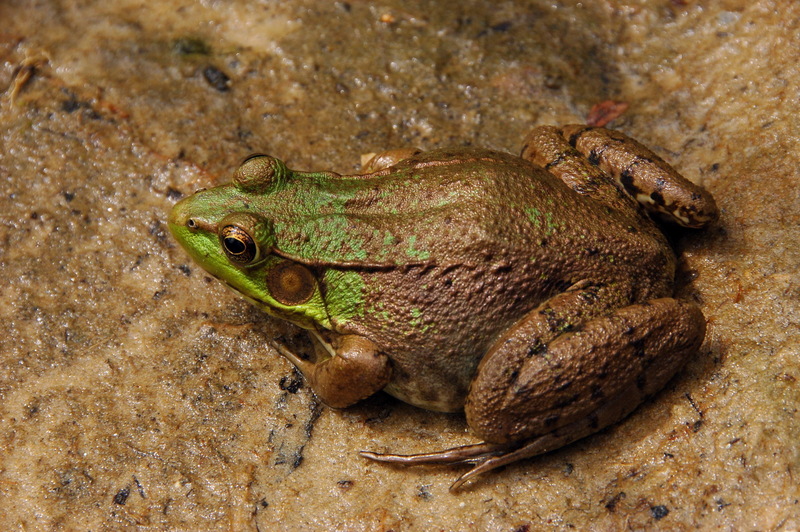ERROR : Server Busy(-1105)
ERROR : Server Busy(-1105)
Green Frog (Lithobates clamitans) - Wiki
Green frog
From Wikipedia, the free encyclopedia
[Photo] Photograph of a Green Frogen (Rana clamitans en ). Photo taken at the Tyler Arboretum. Fran??ais : Grenouille verte (Rana clamitans). Photo prise dans l'Arboretum de Tyler, en Pennsylvanie. Date Sunday, June 10, 2007. Author Photo by and (c)2007 Derek Ramsey (Ram-Man) http://en.wikipedia.org/wiki/User:Ram-Man
The Green Frog (Lithobates clamitans, previously Rana clamitans) is a species of frog native to the eastern half of the United States and Canada.
Description
The Green Frog ranges from 2-4 inches (5-10 cm) in size, with the male having a large prominent tympanum and a yellow throat in contrast to the female's white throat and smaller eardrum. Dorsolateral ridges are prominent in contrast to the Bullfrog whose dorsolateral ridges are absent. Contrary to its name, it can be found in various colors (bronze, brown, and light green) depending on its habitat region. Some rare individuals are being blue.
Behavior
The Green Frog lives in and near shallow water - springs, brooks, swamps, ponds and lakes which have a considerable amount of vegetation. They seem to tolerate ponds of urban areas. This frog is primarily nocturnal and is not as wary as many other species of frog. Fleet of foot and difficult to spot, this frog is often noted only indirectly as it flees into the water. Adult males are mostly easily approached during the breeding season when defending their territories. They rarely scream in alarm when captured. Green frogs are strongly aquatic, both as adults and in tadpole stage. Males defend their territories and may have a wrestling matches with other males that invade their territory.Green frogs are active during day and night. They become dormant during cold weather. Green frogs are mainly solitary, except during breeding season, when they congregate at breeding ponds.
Reproduction
Green frogs breed in semi-permanent or permanent freshwater habitats of various size and vegetation structure. The call is often compared to the twang of a banjo string, usually given as a single note, but sometimes repeated rapidly several times to designate its territory. Its breeding season is from March to August. Breeding takes place in late spring; variations in temperature and region can influence actual breeding times.
Once a female has chosen a male, amplexus will begin. During amplexus, 1000 to 7000 eggs may be laid. Eggs are laid in 3-4 small clutches that are attached to submerged vegetation. Green frog tadpoles are olive green and iridescent creamy-white below. Metamorphosis can occur within the same breeding season or some tadpoles overwinter for one year depending on when eggs were laid. After larvae stage, males are sexually active 1 year after metamorphosis and females may mature in either 2 or 3 years depending on their size.
Diet
Green frogs will consume anything that can fit in its mouth, such as: crickets, flies, fish, crayfish, shrimp, grasshoppers, smaller frogs, tadpoles, small snakes, birds, mollusks, moths, and their own cast skin. Tadpoles consume algae and water plants.
Lifespan
Frogs in captivity live to be 10 years old. The average lifespan in the wild is unknown.
As Pets
Green frogs very hardy and make great pets for beginners, with the proper care and setup, green frogs one of the most stunning and interesting display animals.
Habitat
An aquarium is sufficent for this frog, a 20 gallon can house one. Substrate can be eihter gravel, sand, or no substrate at all. Water should be at least 4 inches deep, and some vegetation. This frog prefers warm water of 65 degrees F and air temp of 80 degrees F. It also require humidity,and a small amount of moisture(Spraying the tank often can accomplish especially of its warm like a greenhouse).
Handling
The frog is very hardy, if it is untamed. Hands must be wet before it is handled, as like most amphibians, as they breathe through their skin. Their skin needs to stay moist in order for the frog to stay healthy
Conservation Status
The current consensus among biologists is that Green frogs do not seem to have as much of an impact on a native frog species as Bullfrogs do. Green frogs are smaller and less aggressive than bullfrogs. However, Green frogs do not compete with native frogs for food and habitat, and there is a risk that this extra pressure may be final straw for some native populations. Some of the frog's population could be down because the loss of natural shoreline vegetation. Green frogs are protected by the law in some states.
Body Structure
The Green Frog has long, powerful hind legs, which make it an excellent leaper. The skin is very smooth and moist. It absorbs oxygen through the skin, processes it in lungs, and releases carbon dioxide. The Green Frog has a 3-chambered heart, like all amphibians. The mouth has teeth with a tongue attached at the front. The Green Frog's large eyes give it excellent vision. The placement of the eyes allows it to see predators without exposing the rest of its body.
Subspecies
There are two recognized subspecies of Lithobates clamitans:
Bronze Frog, Lithobates clamitans clamitans (Latreille, 1801)
Northern Green Frog, Lithobates clamitans melanota (Rafinesque, 1820)
Triva
A person has discovered that the green frog is the fastest amphibian in the world.
Green frog is sometimes called Loud Mouth Frog
http://en.wikipedia.org/wiki/Green_frog
| The text in this page is based on the copyrighted Wikipedia article shown in above URL. It is used under the GNU Free Documentation License. You may redistribute it, verbatim or modified, providing that you comply with the terms of the GFDL. |
|

